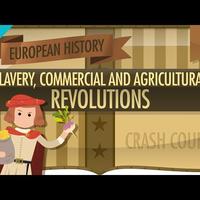Commerce, Agriculture, and Slavery: Crash Course European History #8 (2)
European consumers snapped up goods and merchants grew wealthy.
The increase in consumption was truly unprecedented: For example, in 1660 the East India Company
imported 23 pounds of tea to Britain; in 1750 it imported five million pounds.
[missing text] [[TV: Indiaman]] Besides slavery and colonization,
innovation was also an important facilitator of economic growth.
And I don't just mean innovation in terms of actual things, I also mean innovation in
terms of ideas...like corporations!
The East India companies such as those founded in Britain, the Netherlands, and France focused
each kingdom's international trade and raised funds for investment.
Joint stock companies arose to finance merchant ships.
The development of double entry bookkeeping gave merchants and bankers a better idea of
inflows and expenditures.
However, there wouldn't be laws limiting liability of such companies until much later.
So, a ship lost at sea could still mean the investors' loss of homes and possessions.
Whereas now, when investors do things that lose money, we just give them their money
back.
And talking of bankers brings us to the Fuggers, or Fuggers.
The Fugger family of bankers, who once loaned money to monarchs such as Charles V and Philip
II of Spain, who then spent everything on defeating Protestants, the monarchy's bankruptcy
made the bankers penniless too.
This whirl of commerce disrupted society by producing new values and creating new groups
of wealthy, influential people.
Almost everywhere in Europe, people who weren't aristocrats became rich from global expansion
of trade.
Many of the aristocrats also became richer, of course, but the wealth of new groups of
people upset long-held notions about the importance of family lineage.
And capitalism--that is, the private ownership of enterprises--changed everyday values and
turned activities toward making profit above all else.
Capitalism created a new class of wealthy traders and merchants, who competed for political
influence with those from hereditary status groups such as the nobility.
We'll hear more, of course, about the twists and turns of capitalism across the centuries.
But by the beginning of the eighteenth century capitalism was in a lively stage of development,
thanks to the abundance provided by the agricultural and commercial revolutions and also by the
Atlantic slave trade, which wrenched some eleven to twelve million Africans from their
homes and families.
Thanks for watching.
I'll see you next time.

